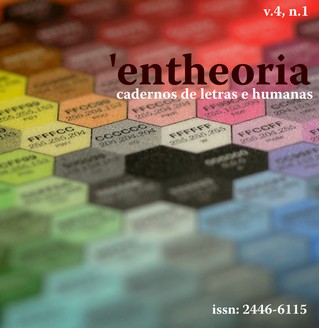Brief reflections upon epistemic interweaving in the novel “the name of the rose”
Keywords:
The Name of the Rose, Umberto Eco, Compared reading, Philosophy and HistoryAbstract
This study aims to reflect upon the epistemic interweaving of several areas of knowledge present in the novel The Name of the Rose by Italian writer Umberto Eco. The book highlights the relationship between cinema and history, literature and history and literature with cinema. This paper also considers the significant immersion in the philosophical scope involving the whole plot of this work. Thus, the analysis of the present study becomes more comprehensive and presents to the reader a rich source of resources and knowledge in the epistemic interweaving present in the text of Eco. In the development of this study, it is emphasized that Eco’s novel – which main theme is the freedom of study, teaching and free circulation of knowledge – is undeniably dense, presents a good sense of humor, and enables one to know how was like to live in a medieval monastery. For this reason, one can consider that the central focus of the work revolves around religious dogmatism, which considered knowledge quite dangerous. In conclusion, we consider the level of involvement of the writer with aspects of different areas of knowledge, and it should be highlighted that the book explicitly refers to “poetic art” of the philosopher Aristotle. Taking all of this into account, this analysis is based on a bibliographical and theoretical approach, provoking a comparative study between the literary text and the cinematographic text, surrounded by aspects of other areas of knowledge in the intertwining present in the literary plot, such as the relation between Cinema and History.Downloads
References
COSTA, Antônio. Compreender o Cinema. 3. ed. São Paulo: Globo, 2003.
ECO, Umberto. O Nome da Rosa. 9. ed. Tradução de Aurora Bernardini e Homero Freitas de Andrade. Rio de Janeiro: Nova Fronteira, 1983.
____________. Pós-Escrito ao Nome da Rosa. Rio de Janeiro: Nova Fronteira, 1985.
FERRO, Marc. Cinema e História. Rio de Janeiro: Paz e Terra, 1992.
HOWARD, David. Teoria e Prática do Roteiro. 3a ed. São Paulo: Globo, 2002.
LE GOFF, J. O Riso na Idade Média. In: BREMMER, J.; ROODENBURG, H. (Org.). Uma História Cultural do Humor. Rio de Janeiro: Record, 2000.
PALMA, Glória. Literatura e Cinema: a demanda do Santo Grall e Matrix, Eurico, o Presbítero e a Máscara do Zorro. Bauru, SP: EDUSC, 2004.
SILVA, Vitor. Teoria da Literatura. 6. ed. Coimbra: Livraria Almedina, 1994.
Downloads
Published
How to Cite
Issue
Section
License
Copyright (c) 2017 Entheoria: Cadernos de Letras e Humanas ISSN 2446-6115

This work is licensed under a Creative Commons Attribution 4.0 International License.
O(s) Autor (es), na qualidade de titular (es) do direito de autor do ensaio ou artigo submetido à publicação, de acordo com a Lei nº. 9610/98, concorda (m) em ceder os direitos de publicação à Revista Entheoria e autoriza(m) que seja divulgado gratuitamente, sem ressarcimento dos direitos autorais, por meio do Portal de Revistas Eletrônicas da UFRPE e sites associados, para fins de leitura, impressão e/ou download pela Internet, a partir da data da aceitação do artigo pelo Conselho Editorial da Revista. É vedada a submissão integral ou parcial do manuscrito a qualquer outro periódico.


























